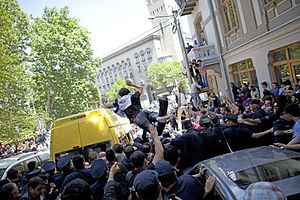| 2013 Tbilisi protests | |||
|---|---|---|---|
 | |||
| Date | 17 May 2013 (2013-05-17) | ||
| Location | Tbilisi | ||
| Methods | Demonstrations, violent clashes | ||
| Parties | |||
| |||
A rally against homophobia was held in Tbilisi, Georgia, on May 17, 2013, the International Day Against Homophobia. Gay rights activists holding the rally were met by thousands of protestors opposing homosexuality, who broke through a police cordon and violently pursued them, beating and throwing stones at them.
Two days earlier, Ilia II of Georgia, the head of the Georgian Orthodox Church, had called for banning the gay rights rally, describing homosexuality as an "anomaly and disease." The day before the rally, Prime Minister Bidzina Ivanishvili stated that LGBTQ individuals "have the same rights as any other social groups" in Georgia.
Dozens of gay rights activists had gathered in downtown Tbilisi for the rally. A reported 20,000 Georgian Orthodox church members protested, led by church priests, and a clash ensued in Pushkin Park, near Freedom Square. Police forces did not prevent the homophobic protesters from running at the anti-homophobia rally participants, as priests asked. Anti-homophobia demonstrators were evacuated by the police in buses, which were attacked by the counter-demonstrators. 17 people were injured in the clashes.
Reaction
The violence was widely condemned by foreign embassies, and non-governmental organisations including Transparency Georgia, the Georgian Young Lawyers' Organization and Amnesty International. Ilia II of Georgia condemned any violence, but reiterated his view that homosexuality is a sin and should not be popularized. The Ministry of Internal Affairs launched an investigation and promised prosecution of the perpetrators. Paul Rimple and Mark Mullen have described the events as part of a larger struggle between the church and the secular government.
On 16 December 2021, the European Court of Human Rights judged that the failure to protect the demonstration by Georgia state was a violation of the articles 3, 14 and 11 of the European Convention on Human Rights.
See also
References
- "Conservatives attack gay activists at rally in Tbilisi". BBC News. 17 May 2013. Retrieved 18 May 2013.
- "Slow Response by Georgians to Mob Attack on Gay Rally". New York Times. 20 May 2013. Retrieved 20 May 2013.
- Delany, Max (18 May 2013). "Church supporters disrupt Georgia gay rights rally". AFP. Archived from the original on June 16, 2013. Retrieved 18 May 2013.
- ^ Harter, Pascale (4 Jun 2013). "From our own correspondent: Sexual mores in Georgia and Denmark". BBC World Service.
- "Georgian Orthodox Church Leader Calls For Gay-Rights Rally Ban". Radio Free Europe/Radio Liberty. 16 May 2013. Retrieved 18 May 2013.
- "Georgian Prime Minister Says Sexual Minorities Have Equal Rights". Radio Free Europe/Radio Liberty. 15 May 2013. Retrieved 18 May 2013.
- "Violence Against Anti-Homophobia Rally". Civil.Ge. Civil Georgia. 18 May 2013.
- Roth, Andrew (17 May 2013). "Crowd Led by Priests Attacks Gay Rights Marchers in Georgia". The New York Times. New York Times. Retrieved 17 May 2013.
- "Antigay Protesters Disrupt Georgian Rights Rally". Radio Free Europe/Radio Liberty. 18 May 2013. Retrieved 18 May 2013.
- "Minister shocked by anti-gay demonstration in Georgia". Government of the Netherlands. 17 May 2013. Retrieved 17 May 2013.
- "Gewalt gegen Homosexuelle: Westerwelle kritisiert georgische Regierung". Spiegel Online. 19 May 2013. Retrieved 19 May 2013.
- "Initial evaluation of observer organizations on the scheduled rally on May 17, the International Day against homophobia and transphobia". GYLA. Archived from the original on 19 October 2014. Retrieved 20 May 2013.
- "Georgia: Homophobic violence mars Tbilisi Pride event". Amnesty International. Archived from the original on 2014-10-28. Retrieved 20 May 2013.
- "Ilia the Second – Church is Against Violence, but Sin Can't be Popularized". Interpressnews. 18 May 2013. Retrieved 18 May 2013.
- "Ministry of Internal Affairs launches investigation into the yesterday's developments". Interpressnews. 18 May 2013. Retrieved 18 May 2013.
- Rimple, Paul (19 May 2013). "Georgia's Homophobic Church". The Moscow Times. Retrieved 19 May 2013.
- "Exclusive: Mark Mullen discusses LGBT supporters' rally in Tbilisi". Georgian News. 18 May 2013. Archived from the original on 20 October 2014. Retrieved 19 May 2013.
- "CASE OF WOMEN'S INITIATIVES SUPPORTING GROUP AND OTHERS v. GEORGIA". European Court of Human Rights. 16 December 2021.